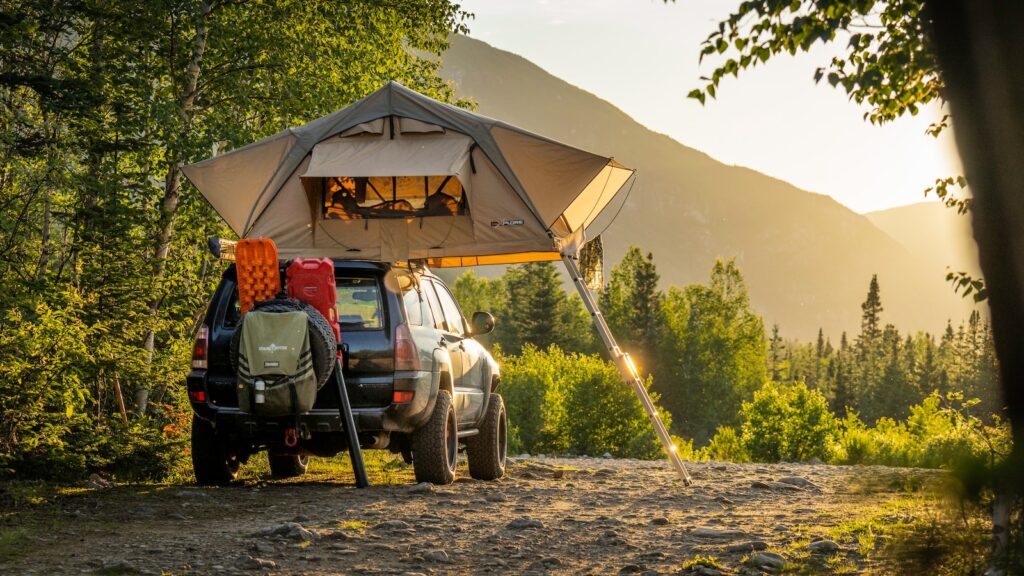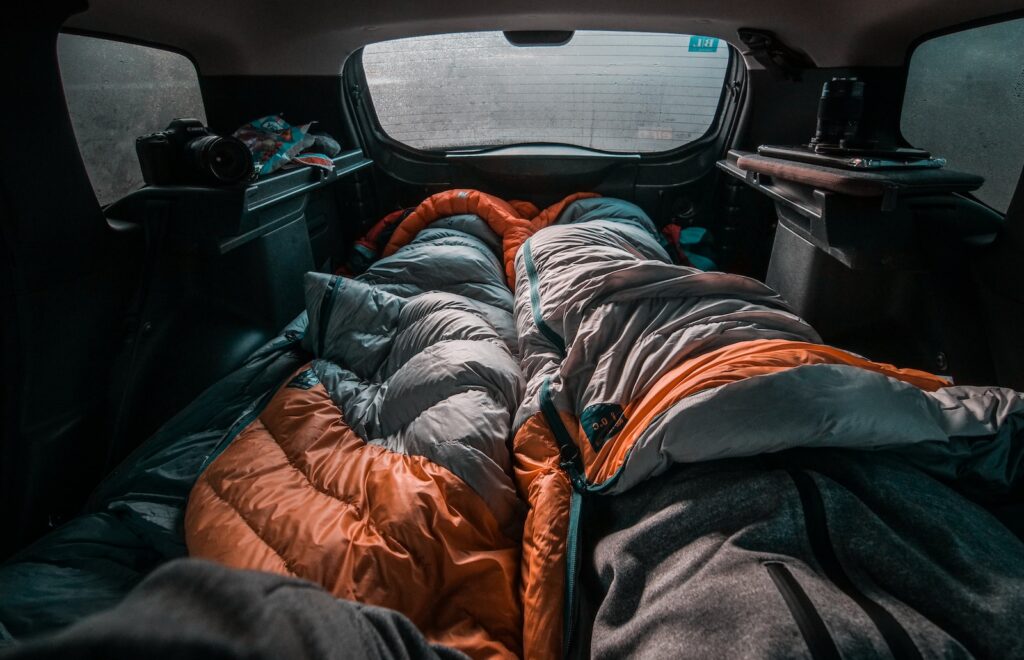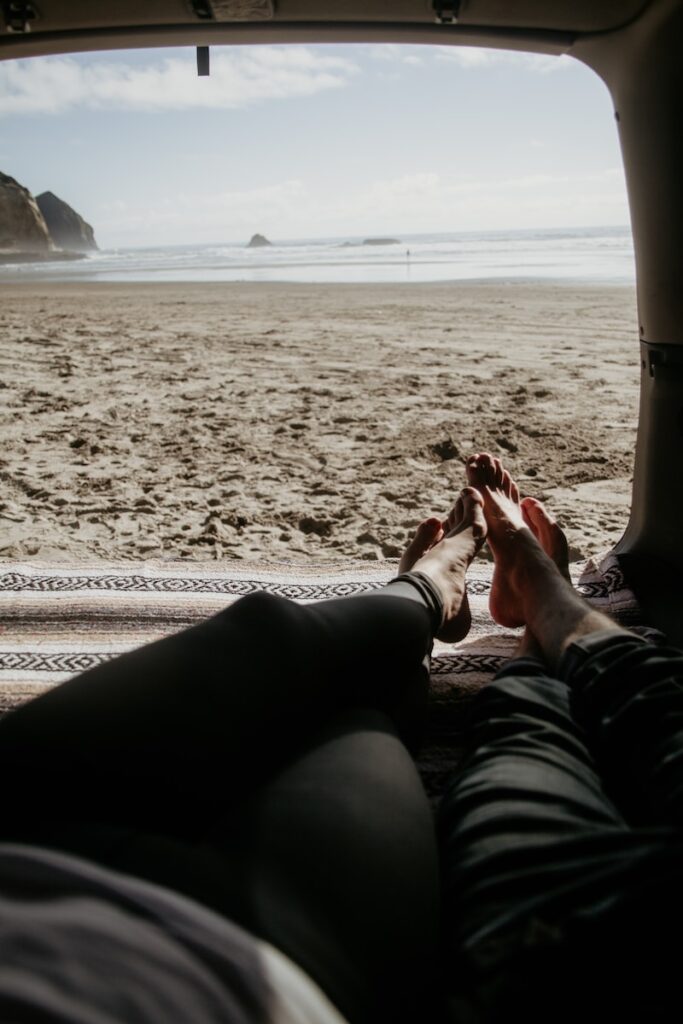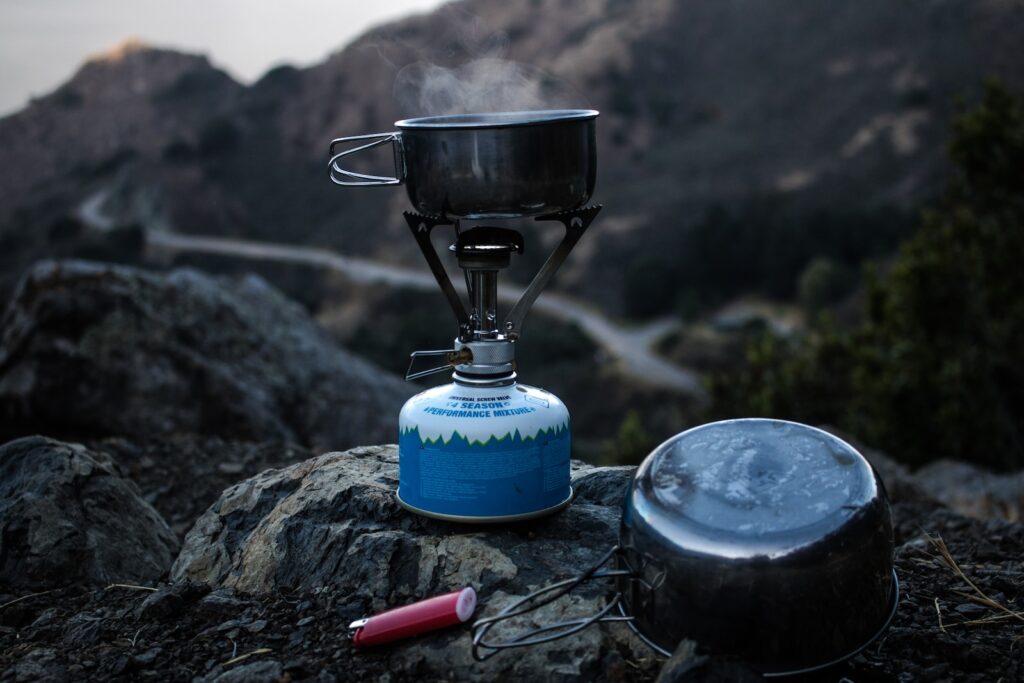
Safe Car Camping Locations: Your Guide to Finding the Perfect Spot
We may earn money or products from the companies mentioned in this post.
Car camping is such a fantastic way to get out there and enjoy the great outdoors while still having the comforts of your own vehicle. Whether you’re a seasoned pro or new to the camping scene, finding a safe and secure spot for your car camping adventure is crucial.

Now, let’s talk about all the cool options you have for car camping. Of course, you’ve got your classic campgrounds and public lands. These spots are usually well-maintained and offer convenient amenities like restrooms, fire pits, and picnic tables. It’s like having a cozy home base while you explore nature’s wonders. Just make sure to check if reservations are needed or if there are any restrictions on vehicle size before you hit the road. There are actually campgrounds that do NOT let you car camp, so checking the individual rules is important.
But wait, there’s more! If you’re up for a little more adventure and seclusion, dispersed camping is the way to go. Picture yourself setting up camp in the great wide open, away from the hustle and bustle of designated campgrounds. It’s a chance to immerse yourself in nature and create your unique experience. Just keep in mind that different areas have different rules and regulations, so make sure you know where you can camp, whether you need permits, and how to dispose of waste properly. It’s all about being a responsible and informed camper.
Just off the Highway
Now that you’ve got the lowdown on the outdoor options, let’s mix it up a bit. How about exploring some commercial spots that are camper-friendly? Picture yourself spending the night in a casino parking lot. Yes, you heard that right! Some casinos actually allow overnight parking for RVs and campers. It’s a fun and convenient option for a quick rest stop during your journey.
And here’s another unexpected gem: sports and recreation facilities. Think stadiums, arenas, and fairgrounds. These places often have spacious parking lots that can accommodate your car camping setup. Imagine waking up surrounded by the buzz of excitement from the previous night’s game or event. It’s a unique way to combine your love for outdoor adventure with some urban flair.
Oh, and let’s not forget about wineries and vineyards! Some of them offer camping facilities for visitors, including car camping spaces. Imagine sipping on a glass of fine wine while enjoying the beautiful vineyard views. It’s an experience that’s hard to beat.
So, whether you choose the traditional campgrounds, venture into dispersed camping, or explore these unexpected commercial spots, let’s look at a few more things.

Understanding Car Camping
Car camping is a popular way to enjoy the outdoors without investing in expensive camping gear. It involves sleeping in your car or setting up a tent near your vehicle. Car camping provides easy outdoor access and allows more room for error than backcountry camping. Here are a few things to keep in mind when planning your car camping trip:
- Safety first: Always prioritize safety when car camping. Choose a safe location to park your car and set up your tent. Be mindful of your surroundings and potential hazards like wildlife, weather, and other campers.
- Choose your location wisely: Research your destination beforehand to ensure that there are safe and legal places to camp. Many national parks and public lands have designated campsites for car camping. Check with local authorities to see if any restrictions or permits are required.
- Pack smart: Since you have the luxury of driving to your campsite, you can bring more gear and supplies than you would for backpacking. However, make sure to pack smart and only bring what you need. Consider investing in a rooftop carrier or storage containers to maximize space in your vehicle.
- Be respectful: Remember to be respectful of the environment and other campers. Leave no trace by packing out all your trash and following campground rules and regulations. Keep noise levels down and avoid disturbing wildlife.
Overall, car camping is a great way to enjoy the outdoors without the hassle of traditional camping. With a little planning and preparation, you can have a safe and enjoyable car camping experience.

Choosing the Right Vehicle for Car Camping
When it comes to car camping, choosing the right vehicle is crucial. A good car camping vehicle needs to have enough space to store all your gear, be comfortable enough to sleep in, and have the capability to handle rough terrain. Here are some factors to consider when choosing the right vehicle for car camping:
Size
The vehicle size you choose for car camping will depend on how many people will be joining you on your trip and how much gear you need to bring. A larger vehicle like an SUV or a van will provide more space for sleeping and storage but will also be less fuel-efficient. On the other hand, a smaller vehicle like a hatchback or a station wagon will be more fuel-efficient but may not have enough space for all your gear.
Sleeping Arrangements
One of the most important factors to consider when choosing a car camping vehicle is the sleeping arrangements. If you plan on sleeping in the vehicle, you’ll need to ensure enough space to stretch out comfortably. Look for a vehicle with fold-down seats or a large cargo area accommodating a sleeping pad or an air mattress.
Off-Road Capabilities
If you plan on camping in remote areas or on rough terrain, you’ll need a vehicle with good off-road capabilities. Look for a vehicle with high ground clearance, four-wheel drive, and sturdy tires that can handle rough terrain.
Fuel Efficiency
Fuel efficiency is an important factor to consider when choosing a car camping vehicle, especially if you plan on taking long road trips. Look for a vehicle with good gas mileage to save money on fuel costs.
Popular Car Camping Vehicles
Some popular car camping vehicles include the Jeep Wrangler, Subaru Forester, Subaru Outback, Toyota 4Runner, and Hyundai Kona Electric. However, any vehicle with the right setup can be suitable for car camping. Even a small car like a Toyota Prius can work with the right gear.
When choosing the right vehicle for car camping, it’s important to consider your specific needs and preferences. By choosing the right vehicle, you can ensure a comfortable and enjoyable car camping experience.
Safe Car Camping Locations
When car camping, choosing a safe location will provide you with a comfortable and enjoyable camping experience is important. Here are some safe locations for car camping:
National Parks
National parks are one of the safest places to go car camping. They are well-maintained and have designated campsites with amenities such as restrooms, fire pits, and picnic tables. Most national parks require reservations for campsites, so it’s important to plan ahead. Additionally, national parks have rangers on duty who can assist and ensure campers’ safety.

State Parks
State parks are another safe option for car camping. They offer similar amenities to national parks, such as designated campsites and restrooms. Some state parks also offer additional amenities like swimming pools and hiking trails. Like national parks, making reservations ahead of time is important to ensure a safe and enjoyable camping experience.
Private Campgrounds
Private campgrounds are owned and operated by individuals or companies. They can range from small, family-owned campgrounds to large, resort-style campgrounds. Private campgrounds often have amenities such as showers, laundry facilities, and playgrounds. While private campgrounds may not offer the same level of natural beauty as national or state parks, they can be a safe and comfortable option for car camping.
Public Lands
Public lands, such as national forests and Bureau of Land Management (BLM) lands, offer opportunities for dispersed camping. Dispersed camping is camping outside of designated campsites, which can provide a more secluded and natural camping experience. However, it’s important to research the specific regulations for dispersed camping in each area to ensure that you are camping in a safe and legal location.
Agricultural Lands
Farmers or landowners may allow car camping in some rural areas on their agricultural lands. This can be a unique way to experience the countryside and immerse yourself in rural life. Always obtain proper permission and ensure you follow any guidelines or regulations set by the landowner.

Nature Preserves and Conservancies
Check for local nature preserves or conservancies that allow camping. These protected areas focus on preserving unique habitats, and some may provide opportunities for car camping. They often have fewer visitors, allowing you to enjoy a more tranquil camping experience.
Scenic Byways and Roadside Pullouts
Some scenic byways and highways have designated roadside pullouts where you can park your car and camp overnight. These areas usually offer picturesque views, and as long as you follow local regulations and leave no trace, they can be a convenient option for car camping during road trips.
Rest Areas
Rest areas along highways often allow travelers to take a break, use restrooms, and sometimes even sleep in their vehicles. While primarily intended for short-term stays, some rest areas allow overnight parking. Checking the regulations and signage at each rest area is important, as policies can vary.
Walmart Parking Lots
Many Walmart stores across the United States allow overnight parking for RVs and car campers. This can be a convenient and safe option, particularly if you’re on a road trip and need a quick stop for rest. However, it’s important to verify the specific Walmart’s policy regarding overnight stays, as not all locations permit it.

Cracker Barrel Restaurants
Cracker Barrel is a chain of restaurants known for their country-style food and retail stores. Some Cracker Barrel locations permit overnight parking for RVs and campers. Similar to Walmart, it’s crucial to confirm the policy with each specific restaurant before planning an overnight stay.
Truck Stops
Truck stops, such as those operated by major chains like Pilot Flying J, TA, and Love’s, often provide services and amenities for long-haul truckers. Many truck stops have designated areas where car campers can park overnight. These locations typically offer facilities like restrooms, showers, and convenience stores.
Casinos
Some casinos allow overnight parking for RVs and campers in their parking lots. While primarily intended for casino guests, they may also permit car campers to stay. It’s essential to check with each specific casino about their policies and any potential fees.
Sports and Recreation Facilities
Certain sports and recreation facilities, such as stadiums, arenas, and fairgrounds, may offer parking spaces for overnight stays. These venues often have large parking lots that can accommodate RVs and campers. However, availability and policies may vary, so it’s advisable to contact the facility beforehand.
Beaches
Some beaches permit overnight parking or have designated areas where car campers can stay. Coastal areas with public beaches may have regulations allowing camping in certain sections. It’s important to research local ordinances, obtain any necessary permits, and adhere to specific guidelines to ensure a safe and legal stay.

Wineries and Vineyards
Some wineries and vineyards offer visitors camping facilities, including car camping spaces. These locations can provide a unique experience, combining wine tasting and camping. Be sure to inquire about availability, reservation requirements, and any associated fees.
Equestrian Campgrounds
Equestrian campgrounds are designed primarily for horse owners and enthusiasts, but they often welcome other types of campers as well. These campgrounds typically offer spacious sites and sometimes have facilities like restrooms and water access. Research equestrian campgrounds in your area to see if they allow car camping
Keep in mind
It’s important to note that while all of these options can be convenient for a night’s sleep during road trips, they may not all provide the same outdoor experience or natural scenery as traditional camping locations. They often prioritize safety, accessibility, and convenience.
Additionally, regulations and policies can vary between different establishments and regions, so it’s crucial to research and confirm the specific rules and guidelines for each location you plan to use for car camping. Planning ahead really is the key!
Essential Gear for Car Camping
When it comes to car camping, having the right gear can make all the difference in ensuring a safe and comfortable trip. Here are some essential items to consider bringing on your next car camping adventure:
Shelter
A sturdy and reliable tent is a must-have for any car camping trip if you aren’t planning to sleep in your car. Look for a tent that is easy to set up and take down and that can withstand various weather conditions. Additionally, consider bringing a tarp to place under your tent to protect it from moisture and debris.
Sleeping
A comfortable sleeping setup is crucial for a good night’s rest. Consider investing in a high-quality sleeping bag and sleeping pad to keep you warm and cushioned throughout the night. An air mattress or cot can also be a great option for added comfort.

Cooking
Cooking gear is essential for car camping, especially if you plan on preparing your own meals. A portable stove, fuel, and cookware are all necessary items to bring along, unless you are working with items specifically designed for NOT cooking, but we will cover car camping food later. Additionally, don’t forget to bring utensils, plates, and cups for eating and drinking.
Lighting
Proper lighting is important for safety and convenience during your car camping trip. Bring a reliable flashlight or headlamp, as well as extra batteries, to ensure that you can see in the dark. Consider bringing lanterns or string lights to create a cozy and inviting atmosphere around your campsite. There are lots of LED battery-powered options – just check out your local dollar store!
Other Essentials
In addition to the above items, there are a few other essential items to consider bringing on your car camping trip:
- First aid kit
- Insect repellent
- Sunscreen
- Map and compass (you might not have a cell phone signal!)
- Multi-tool or knife
- Water bottles or hydration system
Safety Tips for Car Camping
Car camping is a great way to explore the outdoors and enjoy a budget-friendly adventure. However, staying safe and prepared for any situation is important. Here are some safety tips for car camping:
Wildlife Precautions
When camping in the wilderness, it is important to remember that you are sharing the space with wildlife. Here are some precautions to take:
- Store food and trash in bear-proof containers or hang them from a tree away from your campsite
- Keep a safe distance from wildlife and never approach or feed them
- Make noise when hiking to alert wildlife of your presence
- Keep pets on a leash and supervise them at all times
- Be aware of the signs of wildlife activity, such as tracks and scat, and avoid camping in areas where wildlife is known to be active

Fire Safety
Campfires are a staple for many people but can also be dangerous if not handled properly. Follow these fire safety tips:
- Check for fire restrictions and obtain necessary permits before starting a fire
- Use designated fire rings or build a fire pit with rocks
- Keep a bucket of water or a shovel nearby in case the fire needs to be put out quickly
- Never leave a fire unattended and make sure it is completely extinguished before leaving
- Avoid building fires during windy or dry conditions
Food and Water Safety
Proper food and water handling is essential for a safe and healthy camping trip. Here are some tips:
- Store food in sealed containers to prevent contamination and attractants for wildlife
- Use a separate cooler for drinks and perishable food items
- Wash hands and utensils before handling food
- Boil or treat water from natural sources before drinking to prevent waterborne illnesses
Weather Precautions
Weather conditions can change quickly in the wilderness, so it is important to be prepared. Follow these weather precautions:
- Check weather forecasts before heading out and pack appropriate clothing and gear
- Seek shelter in a sturdy building or vehicle during thunderstorms
- Avoid camping in low-lying areas that may flood during heavy rain
- Protect yourself from the sun with sunscreen, hats, and sunglasses
Respecting Nature and Leaving No Trace
When car camping, respecting nature and leaving no trace is essential. This means you should do your best to minimize your environmental impact and leave the campsite as you found it. Here are some tips to help you practice Leave No Trace principles while car camping:

- Pack it in, pack it out: Whatever you bring, take it back out. This includes food waste, trash, and any other items you bring. Don’t leave anything behind; even small items like cigarette butts can harm the environment.
- Use existing campsites: Instead of creating a new campsite, use an existing one. This helps minimize your impact on the environment and ensures that you’re not damaging any sensitive areas.
- Be mindful of water sources: When camping near water sources, make sure you’re at least 200 feet away from the water. This helps protect the water source and prevent contamination. Also, be sure to use biodegradable soap when washing dishes or yourself.
- Minimize campfire impact: If you plan on having a campfire, ensure you’re in an area where fires are allowed. Use established fire rings or fire pans, and don’t burn anything that’s not wood. When you finish the fire, ensure it’s completely extinguished and cool.
- Respect wildlife: When camping, you’re a guest in the animals’ home. Be respectful and keep a safe distance from wildlife. Please don’t feed them, as this can cause them to become dependent on humans for food.
By following these tips and practicing Leave No Trace principles, you can do your part to protect the environment and ensure that others can enjoy car camping for years to come.
Legal Considerations for Car Camping
When planning a car camping trip, it is important to consider the legal aspects of sleeping in your vehicle. While car camping can be a great way to explore the outdoors and save money on lodging, it is crucial to follow local laws and regulations to avoid fines or legal trouble.
One key consideration is where it is legal to park and sleep in your car. While most states allow people to sleep in their cars at designated rest stops for at least some time, guidelines vary from three-hour limits to overnight stays. It is important to research the specific laws and regulations in the areas you plan to visit to avoid any legal issues.
Another consideration is whether it is legal to camp in your car outside of designated campgrounds. Some areas may restrict where you can park and sleep overnight, while others may require permits or fees for dispersed camping. It is important to check with local authorities or park rangers to ensure you follow the rules and regulations.
Additionally, it is important to consider the safety implications of car camping. Parking in isolated or unsafe areas can put you at risk for theft or other crimes. Parking in well-lit areas, preferably with other campers or travelers nearby is recommended.
In summary, before embarking on a car camping trip, it is crucial to research the legal considerations and regulations in the areas you plan to visit. By following local laws and regulations and prioritizing safety, you can enjoy a safe and legal car camping experience.
Final Thoughts
Car camping is such a fantastic way to immerse yourself in nature and have a blast. But, just like with any adventure, safety, and legality should be on your radar when choosing a spot to park and catch some Z’s.
So, let’s get down to it. When it comes to car camping, a little research and planning ahead go a long way. Check for any specific restrictions or regulations in the area where you’re itching to set up camp. Some places may require permits or charge camping fees, especially in national or state parks. These designated campsites often have handy amenities like restrooms, showers, and fire pits to make your stay comfy.
If you’re the type who craves solitude and wants to go off the beaten path, dispersed camping on public lands might be right up your alley. But here’s the deal: different areas have different rules for dispersed camping, so be sure to know the lay of the land before you pitch your tent. And hey, while you’re out there, always practice Leave No Trace principles. Mother Nature will thank you for it!
Now, let’s talk safety. We want you to have a worry-free car camping experience, so choose your parking spot wisely. Opt for a well-lit and secure location that puts your mind at ease. Avoid isolated areas and consider parking where other campers or people are around. Remember to lock up your car and stash any valuables out of sight. It’s all about peace of mind so you can enjoy your adventure to the fullest!
To wrap it up, car camping is a fantastic way to explore the great outdoors, but choosing a safe and legal spot to park and sleep in your car is crucial. Do your research, plan ahead, and be mindful of any restrictions or regulations. Prioritize your safety by selecting a secure parking location, and get ready to have a blast while you connect with nature. Happy car camping, my friend!
Frequently Asked Questions

What are some safe car camping locations near me?
State parks are a great option for safe car camping locations. They often have amenities like showers, restrooms, and even electrical hookups. National forests also offer car camping opportunities, but it’s important to research the specific area beforehand to ensure safety.
What are some tips for staying safe while car camping?
It’s important always to lock your car doors and keep valuables out of sight. Be aware of your surroundings and trust your instincts. If you’re camping in bear country, make sure to store your food in bear-resistant containers and follow proper bear safety guidelines.
Are there any car camping sites that are specifically designed for seniors?
Yes, some campgrounds offer designated areas for seniors. These sites may have easier access to amenities like restrooms and showers and may be located closer to the campground entrance.
What are some essential items to bring when car camping?
Some essential items to bring when car camping include a tent or sleeping bag, cooking supplies, food, water, and a first aid kit. It’s important also to bring warm clothing and extra blankets, as temperatures can drop significantly at night.
How can I find free car camping locations?
Apps like AllStays and Hipcamp offer a variety of free and paid locations to set up for the night. U.S. Forest Service roads are generally open to overnight parking and camping, but it’s important to research the specific area beforehand to ensure safety.
What are some popular car camping destinations that are known to be safe?
Some popular car camping destinations that are known to be safe include Yosemite National Park, Rocky Mountain National Park, and Grand Teton National Park. However, it’s important always to research the specific area beforehand and follow proper safety guidelines.
